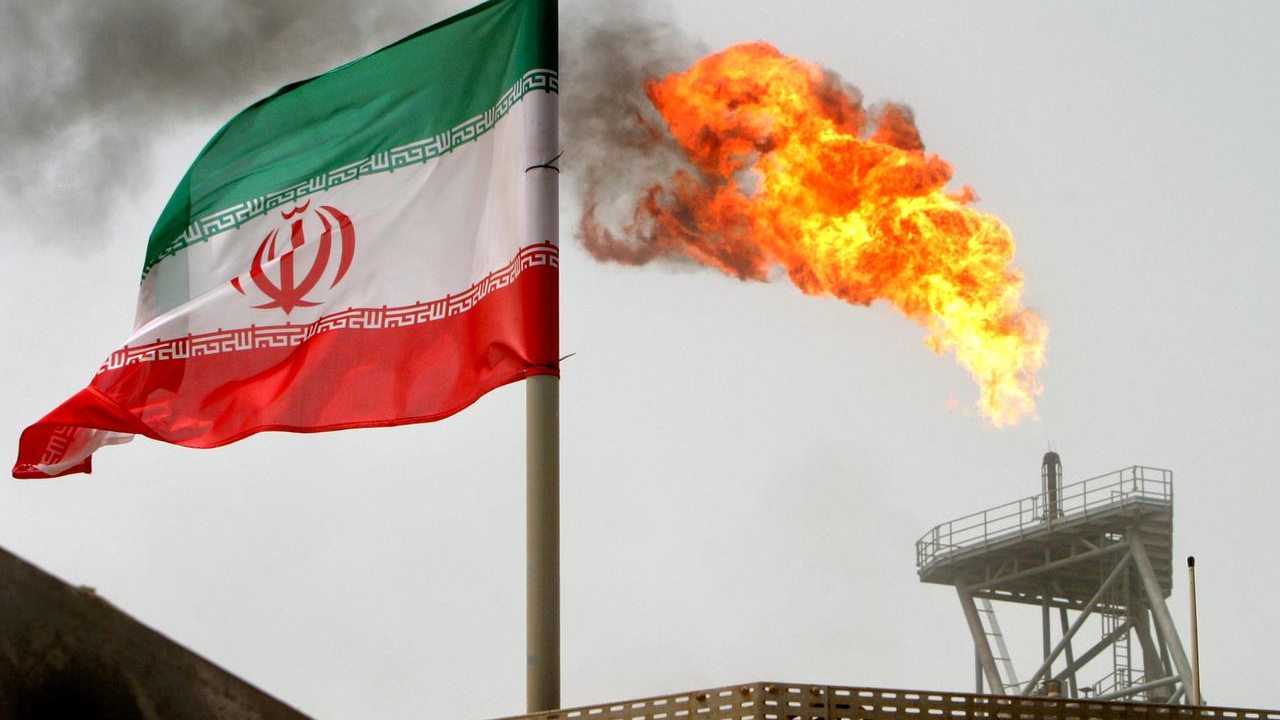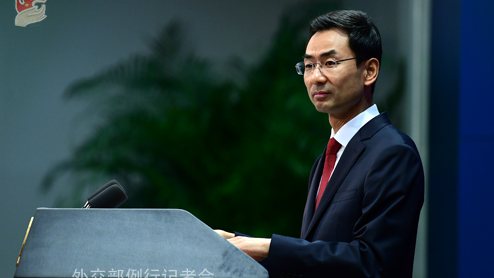

A gas flare on an oil production platform in the Soroush oil fields is seen alongside an Iranian flag in the Persian Gulf, Iran, July 25, 2005. /Reuters Photo
China on Friday firmly rebuffed the U.S. policy of imposing unilateral sanctions through its so-called "long-arm jurisdiction" amid reports that Washington is mulling sanctions against Beijing for buying oil from Iran, prompting speculations that the two global powers may be staring at another face-off even as they attempt to put a lid on their bilateral trade problems with a promise of talks resumption soon.
"It is legitimate and lawful for Iran and other members of the international community, China included, to conduct normal energy cooperation under international law. Such cooperation should be respected and protected," China's Foreign Ministry Spokesperson Geng Shuang said at a press conference in Beijing.
"China opposes unilateral sanctions and the so-called long-arm jurisdiction. We are determined to safeguard our legitimate rights and interests," he added, repeating Beijing's stated position on the subject.
The Chinese response came following a report, published by American media outlet Politico on Thursday, that said senior officials from the Donald Trump administration were pushing for sanctions against Beijing after concluding that China defied U.S. sanctions when it imported more than a million barrels of crude oil from Iran last month. The report cited three unidentified U.S. officials.
According to the report, the U.S. State Department had considered exploiting an Obama-era loophole to issue a waiver allowing Chinese companies to receive Iranian oil as payment in kind for their investment in an Iranian oil field, but that idea has been abandoned.
Hawkish officials within the National Security Council (NSC) are now pushing for the U.S. to impose secondary sanctions on Chinese entities, a move that would complicate the impending trade talks and further strain bilateral relationship, the Politico report stated.
The Trump administration, after unilaterally withdrawing from the landmark 2015 nuclear deal – officially known as the Joint Comprehensive Plan of Action (JCPOA) – last year, has been trying to reduce Iran's oil exports to zero to increase "maximum pressure" on Tehran.
Read also: CGTN exclusive: Is U.S. pushing for a war with Iran?
"Strategically speaking, China and Iran are sitting in the same boat," former senior Iranian diplomat Dr. Mostafa Zahrani told CGTN Digital explaining the U.S. strategy against both Beijing and Tehran.
"Last year's U.S. national security document clearly describes China as the main future challenge for the U.S. While the U.S. for long has had a policy of containing Iran in the Middle East, it similarly aims to contain the rise of China globally," elaborated the former diplomat who had also served as an adviser to Iranian Foreign Minister Javad Zarif.
"One of the conditions of the peace is JCPOA. All the major global powers got together to come up with JCPOA, only the U.S. went out. If everybody wants to have peace and no war, then everybody must stick to JCPOA. You cannot expect only Iran to stick to JCPOA," said Zahrani, currently a professor at Iran's foreign ministry-run School of International Relations.
China snubs U.S. 'unilateral bullying'

Chinese Foreign Ministry Spokesperson Geng Shuang addresses a press conference in Beijing, China, July 11, 2019. /Photo via China's Ministry of Foreign Affairs
China has consistently rejected unilateral sanctions by the U.S. against various nations, including Iran, said Chinese Foreign Ministry Spokesperson Geng Shuang. Earlier on Monday, Geng accused Washington of "unilateral bullying" while emphasizing that the "maximum pressure" exerted by the U.S. is the root cause of the recent crisis.
"The U.S. not only withdrew from the [nuclear] agreement but also set more and more obstacles for Iran and other parties through unilateral sanctions and long-arm jurisdiction. The fact is, unilateral bullying practices, like worsening tumors, are triggering more problems and crises worldwide. The international community must stick to multilateralism and international order based on international law, and seek political and diplomatic solutions to relevant issues through equal-footed dialogue," he said.
Earlier on Wednesday, Fu Cong, the director-general of the Department of Arms Control of the Chinese Foreign Ministry, rejected Washington's "zero-tolerance policy" on Iranian oil sales, asserting that Beijing is “willing to do everything it can to maintain legitimate economic and trade relations with Iran and safeguard economic interests of Chinese companies.”
Addressing the International Atomic Energy Agency (IAEA) Board of Governors meeting in Vienna, where he was leading the Chinese delegation, Fu urged the U.S. to abandon the maximum pressure policy against Iran and reconsider rejoining the nuclear agreement, asserting China's own commitment to the multilateral deal.
"We are fully committed to the JCPOA, and we are making every effort to implement the commitment we have undertaken under the JCPOA. We also believe that the Joint Commission is the right place to discuss issues related to the implementations of JCPOA," he added.
Fu also called on related parties to accelerate efforts and take concrete actions so that Iran could reap the economic benefit promised under the nuclear deal.

Copyright © 2018 CGTN. Beijing ICP prepared NO.16065310-3
Copyright © 2018 CGTN. Beijing ICP prepared NO.16065310-3